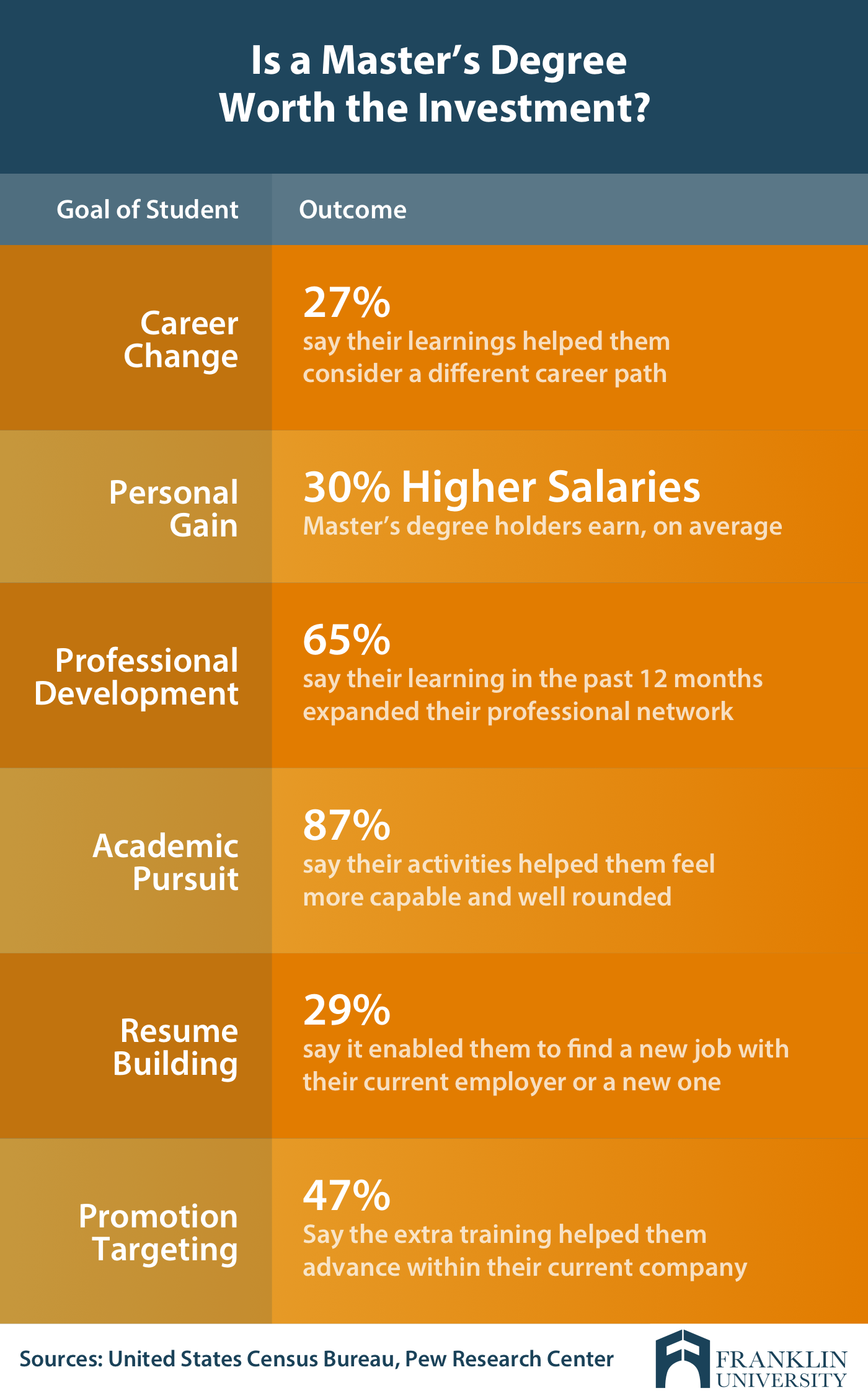Request Information
We're Sorry
There was an unexpected error with the form (your web browser was unable to retrieve some required data from our servers). This kind of error may occur if you have temporarily lost your internet connection. If you're able to verify that your internet connection is stable and the error persists, the Franklin University Help Desk is available to assist you at helpdesk@franklin.edu, 614.947.6682 (local), or 1.866.435.7006 (toll free).
Just a moment while we process your submission.

What is a Master's Degree: Everything You Need to Know
Are you wondering if a Master’s degree is something you should pursue?
It may seem like everyone is asking that question these days. As industries quickly change with the rapid advance of technology and shifting regulations, many people look to an advanced degree to provide stability. In reality, there are many reasons to consider earning a Master’s degree.
Our program directors say the most common reasons current students cite include:
- Career Change: Looking to pursue a new career in a new-to-them field
- Personal Gain: Want to earn more money in their field
- Professional Development: Want to become better at their current job/field
- Academic Pursuit: Want to learn more deeply about a subject or a concept
- Resume Building: Need to learn new skills to enter into the job market
- Promotion Targeting: Need the degree to be eligible for a promotion
- Personal Fulfillment: Enjoy the satisfaction of developing your critical thinking skills and completing advanced courses
Why do people look to Master’s degree to help achieve these goals? What makes a Master’s Degree so special? How is earning one different than earning a Bachelor’s degree? Are earners really more prepared for their careers and lives than those without them?
Welcome to your crash-course in Master’s Programs 101.
What Is a Master’s Degree?
A Master’s Degree is a certification, awarded by an accredited university, recognizing that a person has mastered a well-established and generally-agreed set of knowledge within a specific area.
The Master’s Degree Composition
Earning a Master’s typically requires about 40 credit hours of coursework with a minimum grade of 3.0 (or a B). However, some programs enable students to earn their degrees in fewer credits without compromising the quality and integrity of the coursework.
Master’s-level coursework is generally structured into 4 groups, typically divided as follows:
- The General Courses (~10%): These courses offer the foundational underpinnings of knowledge and information.; they may be merely supportive of your major or tangentially connected to your main focus of study.
- The Major Core (~50%): Your chosen major will have multiple subjects that work together to build a powerful and relevant education for success in the working world. These are the courses that will help you hit the ground running for jobs in your chosen field.
- The Electives (~15%): To meet your total number of hours required for your Master’s degree, you may have some hours left to spend on “elective” coursework. This is classwork that you can choose from a list of electives available in your program. It is part of personalizing your degree and also building yourself into a well-rounded individual.
- The Capstone (~25%): In construction, a capstone is the final stone placed at the top of a building. Similarly, in education, a capstone course is the culmination of your all your Master’s work. It is typically a practical, real-world application of your knowledge. Before beginning your capstone work, you may have to create a proposal that is reviewed and approved by your professor.
Structurally speaking, that’s the basics of a Master’s Degree. But, it’s what’s within the components above that makes a Master’s Degree such a distinguished achievement.
What matters most when choosing a master’s program? Compare features, benefits and cost to find the right school for you.
5 Ways Earning a Master’s is Different from Earning a Bachelor’s Degree
The graduate level is all about applied knowledge.
That means that programs are experience based, and not theoretical. Where a Bachelor’s regimen is typically structured around demonstrating knowledge, the Master’s program is structured around applying philosophies, principles, and guidance to real-world scenarios.
As such, a Master’s and Bachelor’s are distinct in several ways. If you’re considering earning a Master’s degree, you should be prepared for the following:
- Different Type of Thinking. In a Master’s program, students are expected to do far more than just read, memorize, and provide proof of their knowledge. They must be ready to theorize, advance, and create. The knowledge, memorization, and understanding gained in a Bachelor’s degree becomes the foundation for the critical thinking required for a Master’s.
- More Emphasis on Writing. As you move from a Bachelor’s level of work and into Master’s studies, you’ll need to adjust your writing style. You’re expected to be more thorough than just consulting one textbook for information. Get used to seeking out multiple references in your writing. Consider information sources that come at the same topic from different perspectives. Be thoughtful and creative as you triangulate many pieces of information into a cohesive, thought-provoking insight.
- A Capstone Process. As mentioned earlier, to wrap up all of your Master’s work, your program will likely require a capstone project. This is generally not a part of a Bachelor’s program. The capstone can be a challenging process, and cannot be taken lightly.
- Collaborative Community. In a Master’s program, one of the first things many students notice is the difference in peer relationships and mentoring. Graduate work typically requires you to work with the people around you. This high level of collaboration gives you an opportunity to seek out a mentor. It might be a peer, a faculty member, or a person who is already in the career you're pursuing. You’ll find that mentoring is common at the Master’s level of coursework.
- The Need for a Support System. The truth is, you share a powerful bond with your classmates. You’re all working toward a common goal, but each person has a unique set of strengths that can be shared along the way. You give; you get. And everyone wins.
PRO TIP: To apply your abilities, you’ll need to take your writing to the next level. Read more. Write more. Snag interesting passages and save the URLs. Keep a running list of ideas and insights on your smart phone that you may come back to for your capstone project. We recommend keeping notes in Evernote or Google Docs.
What Determines the Quality of the Master’s Degree
In this age of online diploma mills, students should be careful in selecting a reputable program that provides a legitimate degree. As you choose the right school for your Master’s training, ask about the goal of their program and then ask how the school brings that goal to life. What you see below are the pieces that add up to a high-quality Master’s program; the details within these elements are what makes one degree a better choice than another.
- Curriculum Design. Coursework should deeply reflect current events in the industry. It should address what it takes for a 21st-century career. A school should be able to talk with you in depth about trends in employment, because their coursework already addresses those trends. Ask your program how their curriculum is designed, and how frequently its evaluated.
- Advisory Boards. A good school will have advisory boards staffed with current professionals and senior managers. Those advisory boards are constantly asking, "What are today’s employers looking for?" Good advisors ensure the school is only offering degrees that are actually in demand. Be sure to ask your program who sits on the advisory board for the degree you’re seeking.
- Internal Program Review. In each academic area, the program chair regularly undertakes a comprehensive review of the program. There are many elements to be reviewed and updated, for example:
- Review student assessments to see if there are gaps in instruction, learning, or content
- Check with employers to see the education is relevant, competitive, and helpful to their organizations. It’s not just about meeting students' information needs; a Master’s degree-granting school must also focus deeply on employers' needs in the workplace
- Assess the courses themselves to look at the content and quality of the instruction Be sure to ask your program how thoroughly it reviews its programs, and ask for specific changes that have been made as part of that process.
- Accreditation. The U.S. Department of Education governs whether a school earns accreditation. With regular, rigorous reviews, they make sure an institution has the faculty and resources necessary to offer a high-quality academic program. Ask if your program is accredited.
- Program Reputation. Sometimes, you learn a lot about a Master’s degree program merely by listening to what others are saying. What do professional organizations say? (For example, what does the Society for Human Resource Management, or SHRM, say about a school’s MBA program?) Consider what training a professional organization deems to be important, and see if your school is addressing those needs. Check online for reviews of the school and ask your employer if they’ve heard of the program.
Is a Master’s Degree Really Worth the Investment?
Remember those reasons cited above for earning a degree? Research proves the degree does in fact help students realize those goals.

Is a Master’s Degree Right for You?
That’s a question only you can answer.
But, as we’ve seen, there are several advantages (on both a personal and professional level) to making the necessary investments to earn the degree.
According to Joel Gardner, Franklin University’s Department Chair and Instructional Design Faculty Member:
“For many people I've taught, a Master’s is a way to develop and grow in ways you couldn't achieve without the program. It’s a transformation. Think about that. Here’s a program that helps you change who you are fundamentally. In 1 or 2 years, you get a chance to alter how you look at the world, how you think, and how you can contribute to your career. That's pretty amazing.”
In any case, it’s commonly known that going back to school for a Master’s degree isn’t just a walk in the park. Before you start that journey, it’s a good idea to understand the landscape and prepare for what’s ahead. The truth is that the challenge of earning a Master’s degree can be an extremely worthwhile investment—if you remain committed to the program and your reasons for earning the degree.





